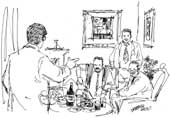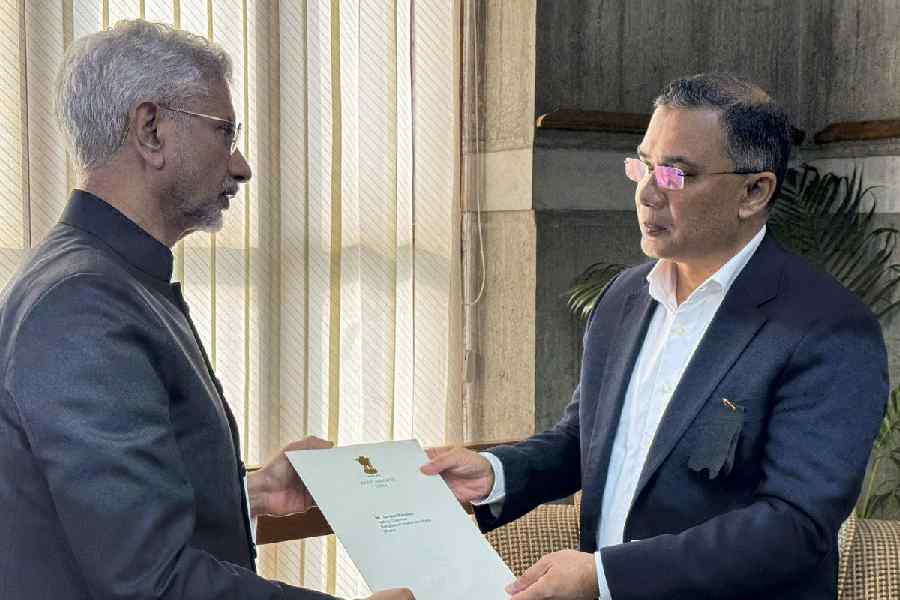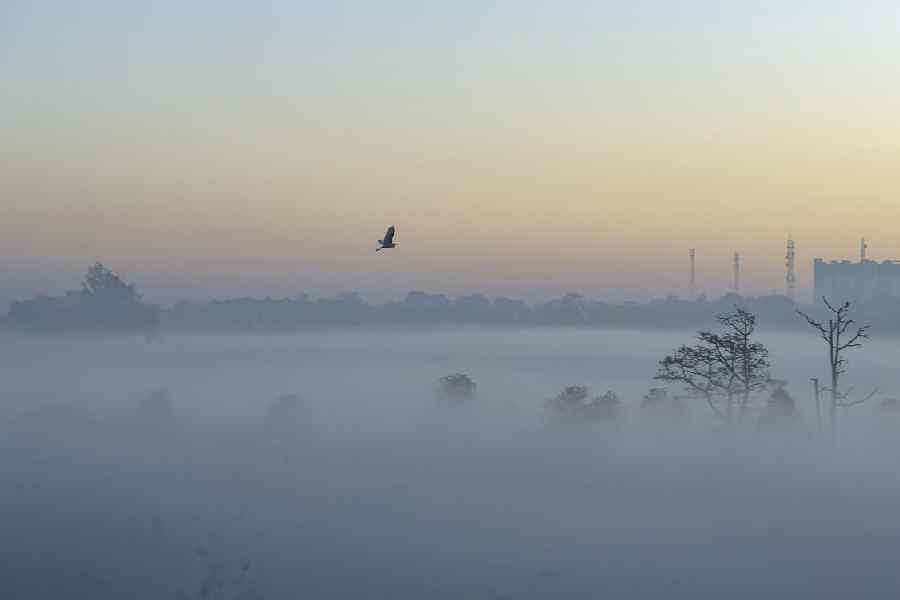 |
We were slightly late and as I and my wife briskly walked into the hall of Guwahati Gymkhana Club, we found the place all agog to hear the artistes of the musical soiree that had been organised that evening.
The commodious hall was almost full and on the makeshift stage musical instruments were being installed and tested by the accompanists. I asked my wife to find a seat for herself and walked straight to the platform to find and test the microphone since I was to introduce the guest artistes that evening. Being satisfied that the cordless set was functioning well, I cast a leisurely glance around the hall. It was indeed a distinguished audience, mostly former planters and people associated with the tea trade and their guests. Formally dressed men were mostly standing around making use of the bar in the corner while the ladies in their fineries were comfortably ensconced in their chairs sipping colas and softly conversing with their neighbours. Sitting in the front row was a spindly gentleman with grey hair and a slight stoop whom I could not remember having seen before and became curious to know who he was. Presently, the musical entertainment got underway and haunting melodies of yesteryears led the audience down the memory lane.
During recess, Bijoy Bhuyan, an eminent former planter, introduced me to the lanky gentleman —“Meet my friend Rajib Roy, a former planter and Arundhati Roy’s father. You wrote about him in your column sometime ago, remember?” I looked at the gentlemen with unconcealed surprise. Was this the man whose escapades as a young tea planter had once been the subject of discussion among his contemporaries who would look upon him with admiration not unmixed with a tinge of envy? Is this the man who is the proud father of the celebrated writer and activist? I found it difficult to believe. He looked more like a misogynous professor minus his thick bifocals rather than a man with a colourful past.
“And, Rajib, he is the one who wrote about you.” I immediately became wary. I tried to remember if while writing about him I had written something inaccurate or had stretched my imagination a little too far. I offered him a cautious hand which he shook almost with disdain and said softly, “Hmmm, I have read your piece. Not bad, partly true and the rest exaggerated. But amusing. However, there were a few mistakes. Arundhati was not born at Salonah tea estate. She was born in Shillong under the medical care of Dr Robert Hughes, an eminent physician in the Welsh Mission Hospital. However, she was partly bought up at Salonah. And my brother Hurricane was not a product of St Paul’s, he was a product of Doon School.”
I tried to apologise for the mistakes, but he waved me away impatiently and continued, “Not your fault, Tapan did not get his facts right. Not his mistake either,” he said blithely. “You know what, Tapan Barua while playing cricket once against the West Indies was knocked on the head by a ball from Wesley Hall, the then fastest bowler in the world. I think that affected his brain,” he laughed gleefully, and that put me at ease. I politely smiled and excused myself since it was time for the next session of the soiree.
Rajib Michael Roy, who now stays with his celebrity daughter in her Kautilya Marg residence in New Delhi, was on a visit to Guwahati to meet his old friends and to spend his holiday with his old pal Bijoy (Bhaiti) Bhuyan. I met Roy over the next weekend and had an opportunity to talk to him again. He confessed that when he had landed in Guwahati on September 3, he had been a little nervous not being sure as to how he would find things in Assam after so many years since he left tea in 1973. But on his arrival here he found to his relief that John (Bhuyan’s nickname with which he was indoctrinated into tea by Alec Hay, an old tea planter) was as jovial and warm as ever. In fact, he found that the camaraderie of the tea planters in Assam, both past and present, had remained unchanged. He was deeply grieved to learn that some of his old planter friends like Bukie Ghaffar, T. Yusouf and Gobindalal Barua were no more.
He was delighted to learn, however, that his last contemporary planter friend Tapan Barua was in Guwahati and he couldn’t wait to meet him. Immediate contacts were made over telephone and a get-together was arranged at Barua’s place the same evening. But as ill-luck would have it, the same afternoon there was a distress call from Barua’s wife, Mamoni, that her husband had suddenly been taken ill and been rushed to hospital. He had gone for his daily sets of tennis in the club where he suddenly felt giddy. Barua is an avid tennis player who still takes the game with the exuberance of a youngster, consequently overdoing things at times. However, later on it was learnt with relief that it was just dehydration and he was released from the hospital the very next day with advice to take things easy.
After having related the story, Roy nodded gravely and said, “I wonder if the threat of my impending visit had anything to do with this dizzy spell of the blighter!” They, however, did assemble at Barua’s place a couple of days later over dinner and went back forty years to the halcyon days of tea!
Both Roy and Barua were together at Salonah tea estate as assistant managers under the legendary R.B. Grierson, a father figure those days in the entire tea district. While Barua was put in charge of the factory, Roy looked after the three outdivisions — Lengteng, Naopani and Anjokpani with a total planted area of 1,200 acres.
Roy disclosed that in 1962 he separated with his wife, Arundhuti’s mother, who left for her home state Kerala. Now that there was none to restrain him, he started putting many of his pranks to practice, particularly over the weekends. However, he never allowed his work to suffer. He narrated a few, including a bet that he had with Tapan Barua regarding obtaining permission from Grierson to go to Upper Assam for the Dibrugarh “meet”. Roy knew the nature of his manager very well. He went and told Grierson about the bet that he had with Barua — a peg of whisky which would knock a mule over. Grierson laughed and gave permission to both of them to go. Those days, the manager had the power to give special leave to an assistant if he really deserved, for fishing, shooting and the like, upto 48 hours.
Once in December 1962, it occurred to Roy that it would be great fun slinking off to Calcutta to watch the Indian Derby. In winter, garden work used to be over by 1 pm. He felt very tempted as he heard the spirit of adventure in him saying “why not?” So, immediately after working hours, he drove off to Guwahati which took him two hours and he was there in the nick of time to catch a Fokker Friendship flight to Calcutta. Soon after landing at Dumdum, he headed straight for the Royal Calcutta Turf Club. Roy’s father, P.L. Roy, once senior general manager of Assam Bengal Railway, knew the trainer Jack Goswell very well and he handed Roy a few tips during the day’s proceedings. Goswell offered him the option of three horses — Polari, Flying Saucer and Water Bird. Roy, however, decided to try his luck on the tip given by Begg, the bookie, and netted a cool Rs 7,000. Thereafter, he hopped into a flight back to Guwahati and from Borjhar took a taxi to Misa where he arrived with four hours to spare before working time. Airfare between Calcutta and Guwahati those days was Rs 125 and so it was quite a profitable trip. This he repeated several times although he was silent about his gains during his subsequent trips. He claimed that his manager did not have a clue about his little adventures.
On the eve of Grierson’s farewell, Roy threw a party where he made a clean breast of all his “misdeeds”. Grierson accepted his confession with good grace and said, “Never you mind, laddie! You were one hell of a chap off-duty. You perhaps did not like my keeping a tight rein on you. But I admire your courage which will certainly help you in taking correct decisions in your future life.”
“Those were the happiest years of my life,” Rajib Roy said with a glint in his eyes. “And hence I am here in Assam again — maybe for the last time.”











